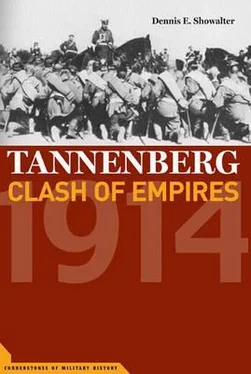It was in these dubious international and domestic contexts that Russia took a step decisive in further estranging her from Germany. Since 1908, direct involvement in the Balkans had seemed less desirable to St. Petersburg than developing a network of proxy relationships. Influence exercised through Sofia or Belgrade offered a plausible excuse for France, and even more for Great Britain, to deny to their domestic critics that they were underwriting Russia’s imperial ambitions. In the short run Russia was concerned less with fostering regional nationalism and nurturing Slavic unity than with establishing a diplomatic counterweight to what seemed heightened German and Austrian influence in the Near East. 30Far from intending to encircle the central powers, fulfill historic missions of liberating the Slavs, or open the way to Constantinople, the Russian foreign office hoped for a league of states strong enough to provide a regional check on any expansionist aspirations entertained by Austria-Hungary. Some proposals even included Turkey as part of the league.
Hindsight indicates that had this initiative succeeded, it would have been a seismic shock to Europe’s increasingly fragile power balance. Such a league could only function under Russian patronage, and would have represented a unilateral strengthening of Russia’s position that Paris and London could hardly have swallowed whole, to say nothing of reactions in Berlin or Vienna. More pragmatically, policy in the Balkan kingdoms was increasingly being made by men with no commitment to Russia’s visions. They dreamed instead of a regional offensive alliance strong enough to expel the Ottoman Empire from Europe and to secure its territory for themselves. Russia was viewed instrumentally: as an insurance policy against the consequences of defeat, and as a mediator with the great powers in case of victory.
Such aspirations were not likely to be modified by even subtle and forceful Russian diplomacy. Holstein had been uncomfortably accurate when he argued that a convoluted foreign policy in the style of Bismarck could only be administered by a Bismarck. Lesser talents must content themselves with simpler patterns. Sazonov was at best a mediocrity who hoped to thrust a hand into the Balkan wasps’ nest and emerge with a fistful of honey. Instead, he proved once again that industry and dullness are a dangerous combination. 31
Russia’s approach to the Balkan question was also influenced by the pessimism of her generals. A constant in European diplomacy since the mid-nineteenth century had been the confidence of its soldiers that they could win, or at least draw, any war the statesmen initiated. Such warnings as they uttered were essentially self-serving admonitions that the situation would be even better were the military budgets increased as requested or current alliance relationships suitably adjusted. The Russo-Japanese War, however, had forced the Russian defense establishment into an agonizing reappraisal. As late as 1911, the Russian general staff bluntly informed the French that it would be two years at least before Russia would have any chance at all in a war with Germany. 32
This was an attitude hardly calculated to inspire confidence in an ally. French generals, increasingly regarding a prompt and massive attack from the east as the Third Republic’s only salvation against superior German numbers, responded by encouraging an increased orientation of tsarist strategy directly against Germany and Austria, with the implied threat of financial and diplomatic sanctions in case of refusal. At the same time, from a Russian perspective, the war ministry and the general staff of a great power could not indefinitely proclaim the impotence of their armed forces to their closest ally. The Franco-Russian alliance incorporated significant elements of interdependence, but was not quite a relationship of equals. The growing Russian acceptance of a necessity for putting early pressure on Germany was a useful way of reassuring the French, while at the same time meeting Russian perceptions of the current strategic situation. 33
Even minimal compliance with French wishes forced Russia’s Balkan and Caucasian frontiers to make do with leftovers. The Caucasus in particular tended to be a dumping ground for guards officers who had made Petersburg or Warsaw too hot to hold them. As a German observer put it, the Russians and the natives copied each others’ bad habits; wine, women, and debts were the order of the day. On the other hand, in the aftermath of the 1908 Young Turk Rebellion Turkey had begun a significant overhaul of her long-moribund military establishment. German training missions and German arms salesmen had long been fixtures in Constantinople. In 1910 the Germans went a step farther by selling the Turks two old battleships. The next year the Turkish government contracted for two more warships, state-of-the-art superdreadnoughts, to be built in Britain. French and American promoters were negotiating the construction of railways in Asia Minor that if completed would significantly expedite the movement of troops along the Black Sea littoral, and to the Russian frontier. Should even some of these improvements succeed Russia’s ability to exercise direct presssure on her southern neighbor would be significantly limited—so limited that good relations with the Slavic states of the Balkans seemed not desirable, but necessary from a military viewpoint. 34
The destabilizing effects of these local power shifts on Europe as a whole became even plainer when, in the spring of 1911, France moved to consolidate its position in Morocco. The German government responded by forcing the issue. Domestic pressure played a role—pressure from Pan-Germans, industrialists, and assorted imperialists convinced either that Morocco represented too great an economic prize to abandon, or that it was a potential key to a future African empire. At the same time the foreign office desired to make a show of German power to a France that seemed all too confident of the strength of its alliances. Offensive diplomacy thus concealed a defensive stand. German policy did not take seriously the prospects of a conflict over North Africa. Neither the naval nor the military commands were consulted on anything more than a formal basis. At the height of the crisis the annual maneuvers, which made mobilization impossible for three weeks, were conducted as usual, and the reservists were discharged at their close. 35
Some results of this policy of unsupported bluster were predictable. Britain and France drew even more closely together, congratulating each other on their solidarity in face of a threat that had proved ephemeral. Russia became correspondingly reluctant to risk becoming the odd state out in an entente. Far more serious, however, was an unexpected side effect. On December 16, 1900, France and Italy had agreed that should France extend her influence in Morocco, Italy could occupy Libya. At the time, it seemed to be one of those dead-letter, hypothetical-situation documents that clog the files of nineteenth-century foreign offices. But over the years Italy had sought and secured affirmation from Germany and Austria, her alliance partners. She had obtained Russian assent as well. Her way thus cleared, Italy went to war with the Ottoman Empire in September, 1911. The great powers, their hands tied by their own actions, stood by. 36
This collective inaction during an overt attack on Turkey was carefully noted in the Balkan capitals. Since the Bosnian Crisis, St. Petersburg had been under pressure to affirm its Slavic identity with more than words. Sazonov’s hopes of a half-million Slav bayonets forever barring the Teuton from southeast Europe combined with his personal indecisiveness to encourage an increasing number of contradictory, mutually exclusive assurances to his Balkan negotiating partners. Russia’s best and most forceful ambassador in the region, Nicholas Hartwig in Belgrade, was a committed Panslav and Austrophobe whose success in improving Serbo-Bulgarian relations made it correspondingly difficult for Sazonov to strike a balance between the Balkan states on one hand and the Dual Alliance on the other—not that Hartwig particularly cared. Ministers come and go, he was alleged to have said. Serbia should rely instead on a Russia that loved her, would always love her, and would not leave her in the lurch. 37
Читать дальше












